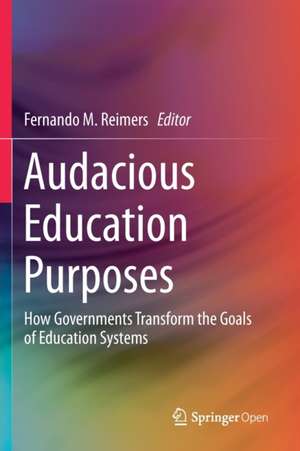Audacious Education Purposes: How Governments Transform the Goals of Education Systems
Editat de Fernando M. Reimersen Limba Engleză Paperback – 18 sep 2020
| Toate formatele și edițiile | Preț | Express |
|---|---|---|
| Paperback (1) | 386.22 lei 6-8 săpt. | |
| Springer International Publishing – 18 sep 2020 | 386.22 lei 6-8 săpt. | |
| Hardback (1) | 426.72 lei 6-8 săpt. | |
| Springer International Publishing – 24 apr 2020 | 426.72 lei 6-8 săpt. |
Preț: 386.22 lei
Nou
Puncte Express: 579
Preț estimativ în valută:
73.92€ • 76.88$ • 61.95£
73.92€ • 76.88$ • 61.95£
Carte tipărită la comandă
Livrare economică 13-27 martie
Preluare comenzi: 021 569.72.76
Specificații
ISBN-13: 9783030418847
ISBN-10: 3030418847
Pagini: 250
Ilustrații: X, 250 p. 18 illus.
Dimensiuni: 155 x 235 mm
Greutate: 0.37 kg
Ediția:1st ed. 2020
Editura: Springer International Publishing
Colecția Springer
Locul publicării:Cham, Switzerland
ISBN-10: 3030418847
Pagini: 250
Ilustrații: X, 250 p. 18 illus.
Dimensiuni: 155 x 235 mm
Greutate: 0.37 kg
Ediția:1st ed. 2020
Editura: Springer International Publishing
Colecția Springer
Locul publicării:Cham, Switzerland
Cuprins
Chapter 1. Thinking multidimensionally about ambitious educational change (Fernando M. Reimers).- Chapter 2. Curriculum Reform in Brazil to Develop Skills for the 21st Century (Claudia Costin and Teresa Pontual).- Chapter 3. Curriculum and Teacher Education Reforms in Finland That Support the Development of Competences for the 21st Century (Jari Lavonen).- Chapter 4. Japanese Education Reform towards 21st Century Education (Shinichi Yamanaka and Kan Hiroshi Suzuki).- Chapter 5. Education truly matters: Key Lessons from Mexico’s Educational Reform for Educating the Whole Child (Elisa Bonilla-Rius).- Chapter 6. Peru: a wholesale reform fueled by an obsession with learning and equity (Jaime Saavedra and Marcela Gutierrez-Bernal).- Chapter 7. Reforming Education in Poland (Jerzy Wisniewski and Marta Zahorska).- Chapter 8. Curriculum and educational reforms in Portugal: An analysis of why and how students’ knowledge and skills improved (Nuno Crato).- Chapter 9. From the “best in the world” Soviet school to modern globally competitive school system (Isak Froumin and Igor Remorenko).
Notă biografică
Fernando M. Reimers is the Ford Foundation Professor of the Practice of International Education and Director of the Global Education Innovation Initiative and of the International Education Policy Masters Program at Harvard University. An expert in the field of Global Education, his research and teaching focus on understanding how to educate children and youth so they can thrive in the 21st century. He is a member of UNESCO’s high level commission on the Futures of Education.
vnaifoijo
vnaifoijo
Textul de pe ultima copertă
This open access book offers a comparative study of eight ambitious national reforms that sought to create opportunities for students to gain the necessary breath of skills to thrive in a rapidly changing world. It examines how national governments transform education systems to provide students opportunities to develop such skills. It analyses comprehensive education reforms in Brazil, Finland, Japan, Mexico, Peru, Poland, Portugal and Russia and yields original and important insights on the process of educational change. The analysis of these 21st century skills reforms shows that reformers followed approaches which are based on the five perspectives: cultural, psychological, professional, institutional and political. Most reforms relied on institutional and political perspectives. They highlight the systemic nature of the process of educational change, and the need for alignment and coherence among the various elements of the system in order. They underscore the importance of addressing the interests of various stakeholders of the education system in obtaining the necessary impetus to initiate and sustain change. In contrast, as the book shows, the use of a cultural and psychological frame proved rarer, missing important opportunities to draw on systematic analysis of emerging demands for schools and on cognitive science to inform the changes in the organization of instruction. Drawing on a rich array of sources and evidence the book provides a careful account of how education reform works in practice.
Caracteristici
Offers original and important insights on how countries change schools Analyses comprehensive national education reforms in eight different countries Traces the roots of current efforts to make education relevant
